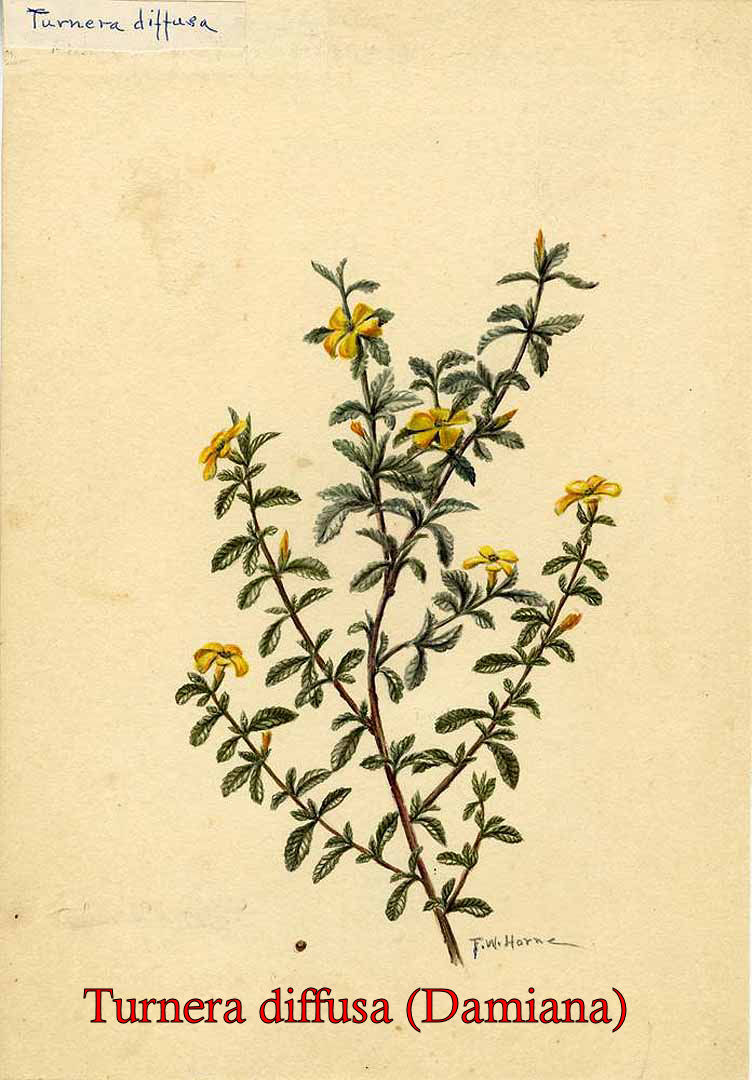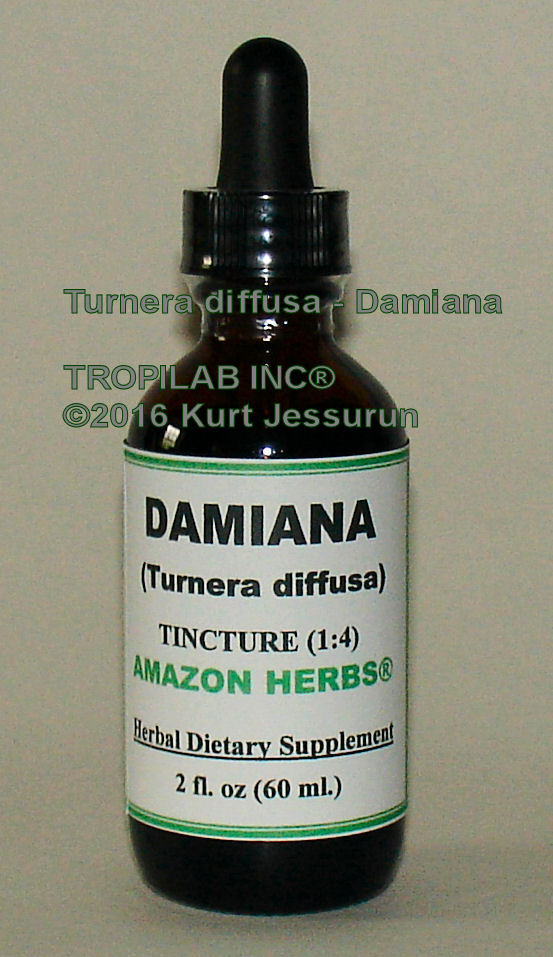 |
 |
|
DAMIANA TEA (infusio Turnera diffusa) from AMAZON HERBS® |
|
Overview Damiana is a small tropical shrub, indigenous to South and Central America. The leaves are used for medicinal purposes.  In Traditional Medicine, Damiana is used as an aphrodisiac (naturally increases sexual desire and enhances
performance). However, there are also other applications such as antidepressant, nerve tonic (mild depression and anxiety),
diuretic, cough-suppressant, kidney, menstrual, pregnancy disorders and mild laxative.
In Traditional Medicine, Damiana is used as an aphrodisiac (naturally increases sexual desire and enhances
performance). However, there are also other applications such as antidepressant, nerve tonic (mild depression and anxiety),
diuretic, cough-suppressant, kidney, menstrual, pregnancy disorders and mild laxative.The leaf infusion (medicinal tea) is used as a traditional remedy in diseases related to the gastrointestinal and respiratory systems, reproductive organs, Parkinson's disease, PMS, inflammation of the prostate and as a remedy for gonorrhea in Latin American societies. Damiana is approved for food use by the United States Food and Drug Administration (FDA). Constituents Flavonoids (Gonzalitosin I), Cyanoglycoside (Tetraphyllin B), Volatile Oils (alpha-pinene, beta-pinene, p-cymene, 1, 8-cineole) Phytosterol (beta-sitostero), beta carotene, Hydrocarbons (triclosan-2-one hexacosanol) Phenolic Glycoside (Arbutin) Damianin, pinocembrin, acacetin, tannins. Pharmacology Research suggests that Damiana relieves anxiety, depression and headaches during menstruation and exhaustion. It also helps to balance female hormone levels and control hot flashes. Components in Damiana bound to progesterone receptors in human breast cancer cells, leading researchers to surmise that it had a neutral or anti-estrogenic activity. Damiana is reported as one of the top six highest progesterone-receptor binding herbs commonly consumed. New research on the ability of Turneraceae (family to which Damiana belongs) to avoid ulceration of the gastric and duodenal mucosa, suggests that the flavonoids present in Damiana have a significant anti-ulcerogenic effect. This can lead to Turneraceae as a new source of anti-ulcerogenic drugs*. The anti-ulcerogenic effect of the extract and of the ethanolic fraction may be related to an increase of mucosal defensive factors, such as prostaglandin and mucus. The anti-inflammatory actions of the extract and the fraction may be due to an inhibitory effect on histamine and cyclooxygenase II. The major substances present in the ethanolic fraction are flavonoids. Due to the phytochemical Arbutin, Damiana can be helpful in cases of urinary infections, such as cystitis (inflammation of the bladder). Arbutin is converted to hydroquinone, a compound with astringent properties that works on the urinary tract.  Anti-inflammatory studies were conducted using a crude hydroalcoholic extract of the aerial parts of Turnera and its
partitioned fractions, i.e. the aqueous, ethyl acetate and ethanolic fractions.
Anti-inflammatory studies were conducted using a crude hydroalcoholic extract of the aerial parts of Turnera and its
partitioned fractions, i.e. the aqueous, ethyl acetate and ethanolic fractions.The anti-ulcerogenic effect of the extract and of the ethanolic fraction may be related to an increase of mucosal defensive factors, such as prostaglandin and mucus. The anti-inflammatory actions of the extract and the fraction may be due to an inhibitory effect on histamine and cyclooxygenase II. The major substances present in the ethanolic fraction are flavonoids. Due to the phytochemical Arbutin, Damiana can be helpful in cases of urinary infections, such as cystitis. Arbutin is converted to hydroquinone, a compound with astringent properties that works on the urinary tract. A recent research reported that the active ingredients pinocembrin and acacetin are potent inhibitors of the aromatase enzyme. Aromatase converts testosterone into estrogen, so the testosterone levels are kept higher. Dosage Tincture: 1 - 5 ml daily, to regulate female cycles of the reproductive system and hot flashes. Infusion (herbal tea): 2 - 3 cups daily. When used as such, it has a relaxing effect similar to low doses of cannabis. As a natural sexual stimulant, 5 ml of the herbal tincture 30 - 45 minutes before sex. It can be used by both men and women. As a nerve tonic; 4 ml. 2 times daily. Precaution Damiana tea is fragrant with a delicious aroma and a light, agreeable bitter taste. Do not use during pregnancy since it is used as an abortive in traditional medicine. Since it is a nervous system stimulant, epileptics should take care in using it. *Antiulcer drugs are a class of drugs exclusive of the antibacterial agents, used to treat ulcers in the stomach and the upper part of the small intestine. Visit also the "Damiana plant" page. Reference Phytochemical investigation of Turnera diffusa Zhao J., et.al. Journal of Natural Products, 2009 Feb;70(2):289-92. Turnera diffusa Wild (Turneraceae) recovers sexual behavior in sexually exhausted males. Estrada-Reyes R., et. al. Journal of Ethnopharmacology, 2009 June 25; 123(3): 423-9. Hypoglycemic herbs and their action mechanisms. Hui, H., et.al. Chinese Medicine, 2009 June 12; 4:11. Weight loss and delayed gastric emptying following a South American herbal preparation in overweight patients. Anderson T, et. al. Journal of Human Nutrition and Dietetics, 2001 June; 14 (3): 243-50 Prescription for Herbal Healing: an Easy-To-Use A-Z Reference to Hundreds of Common Disorders and Their Herbal Remedies. Phyllis A. Balch. 2002 The Healing Power of Rainforest Herbs Leslie Taylor. 2005 The above presentation is for informational and educational purposes only. It is based on scientific studies (human, animal, or in vitro), clinical experience, or traditional usage. For many of the conditions discussed, treatment with prescribed (RX) or over - the - counter medication (OTC) is also available. Consult your doctor, practitioner, and/or pharmacist for any health problem and before using dietary supplements or before making any changes in prescribed medications. |
For the right freight rate, please visit our Webstore page! |
|
TROPILAB® INC copyright disclaimer |